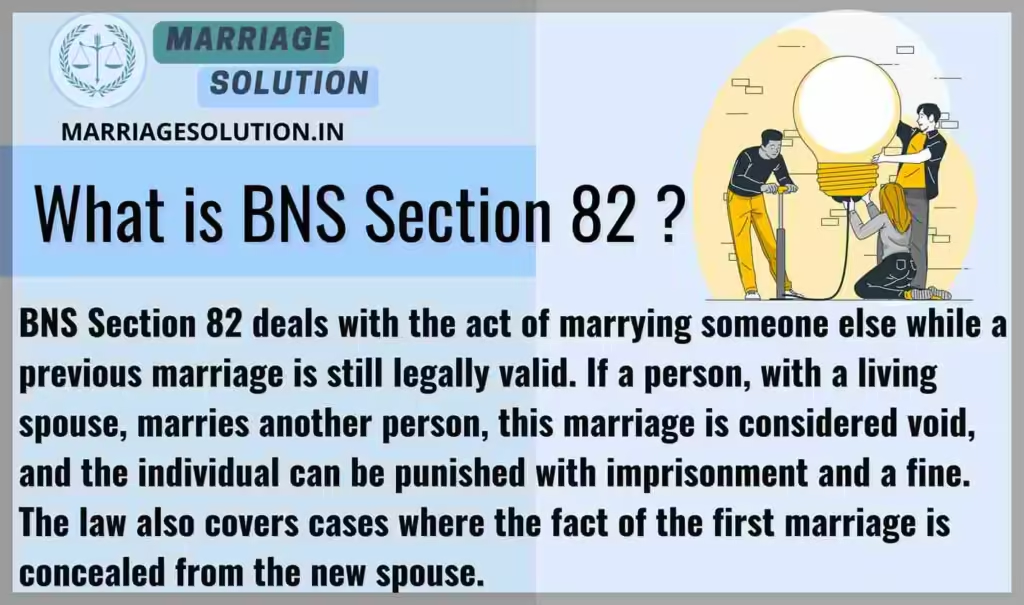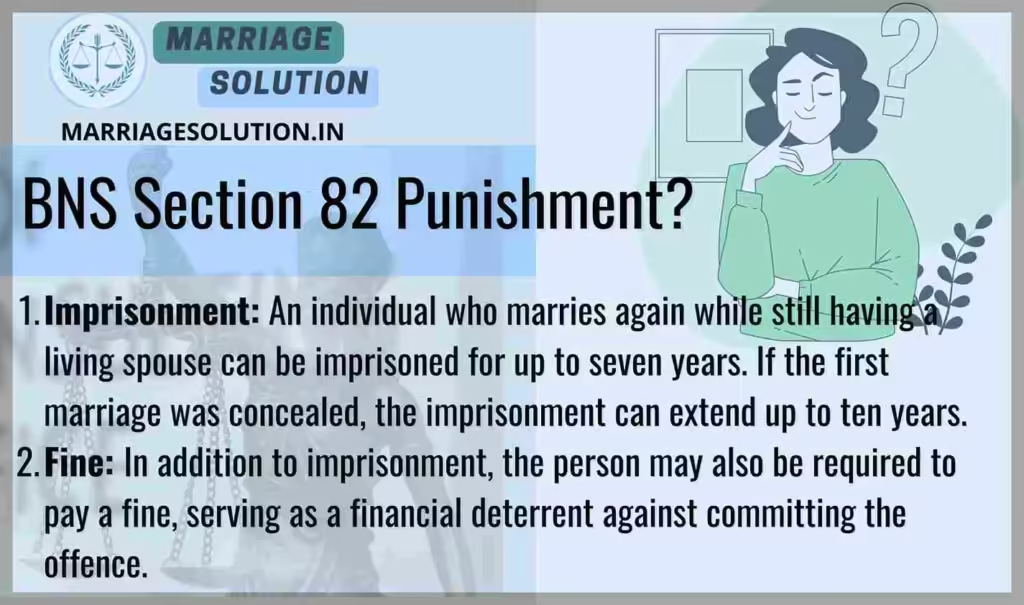Introduction of Section 82 BNS
BNS Section 82 addresses the offence of marrying another person while already having a living spouse, which makes the second marriage void. This section outlines the legal consequences for individuals who enter into such a marriage and provides exceptions for specific situations where the second marriage may not be considered illegal.
What is BNS Section 82 ?
BNS Section 82 deals with the act of marrying someone else while a previous marriage is still legally valid. If a person, with a living spouse, marries another person, this marriage is considered void, and the individual can be punished with imprisonment and a fine. The law also covers cases where the fact of the first marriage is concealed from the new spouse.

Bharatiya Nyaya Sanhita Section 82
BNS Section 82 addresses two major offences:
- Bigamy – marrying again while the first spouse is still alive and the marriage is legally valid.
- Concealing the First Marriage – hiding the fact of an existing marriage from the new spouse at the time of remarriage.
This provision replaces IPC Section 494 but with an additional safeguard by criminalizing concealment of the first marriage separately.
1. Meaning of Section 82
- Bigamy: If a person marries again while his/her husband or wife is still alive, the second marriage is considered void, and the act becomes a punishable offence.
- Concealment of First Marriage: If someone hides the fact of their existing marriage while marrying again, it is treated as a more serious offence.
Exceptions exist (e.g., spouse not heard of for 7 years, divorce, or the marriage declared void).
2. Purpose of Section 82
The purpose of this section is to:
- Protect the sanctity of marriage by preventing multiple marriages while the first marriage subsists.
- Safeguard the rights of spouses (especially women) who may be misled by a partner hiding their first marriage.
- Impose stricter penalties for deception, especially when concealment is involved.
3. Essential Ingredients of Section 82
For Bigamy:
- A valid first marriage must exist.
- The spouse must still be alive.
- The second marriage must be conducted in a way that appears valid.
For Concealment:
- The accused must have a valid first marriage.
- At the time of second marriage, the fact of the first marriage is hidden from the new spouse.
- The concealment must be intentional.
4. Punishment under BNS Section 82
- Bigamy (Second Marriage During Lifetime of Spouse): Imprisonment up to 7 years + fine.
- Concealment of First Marriage: Imprisonment up to 10 years + fine.
5. Examples of Section 82 in Action
- Example 1 (Bigamy): A man legally married marries another woman without divorce. The second marriage is void, and he is punishable under Section 82.
- Example 2 (Concealment): A woman, already married, hides this fact and remarries. She can be punished with up to 10 years of imprisonment.
- Example 3 (Exception): If the first spouse has not been heard of for 7 years, remarriage is not punishable.
6. Importance of Section 82
- Protects individuals (especially women) from fraudulent or secret remarriages.
- Reinforces monogamy as a legal and social norm.
- Introduces stricter punishment for concealment, making the law stronger than the old IPC.
Section 82 BNS Overview
BNS Section 82 deals with the act of a person marrying again while their first spouse is still alive, which makes the second marriage legally invalid. If a person remarries under such conditions, they can be punished with imprisonment for up to seven years and a fine. There are exceptions, such as if the first marriage was legally declared void or if the spouse has been missing for seven years.
Section 82 BNS Overview – 10 Key Points
1. Illegal Second Marriage
Under this law, marrying someone else while your first spouse is still alive is completely illegal. Such a second marriage has no legal recognition and is automatically considered void.
2. Seven-Year Imprisonment
The law imposes up to seven years of imprisonment for those found guilty of committing bigamy. This ensures that people take marriage seriously and do not misuse the law to deceive others.
3. Fine Imposed
In addition to jail time, the offender may also be required to pay a fine. This financial penalty makes the punishment more impactful, discouraging offenders from attempting such deceitful acts.
4. Hiding the First Marriage
If a person conceals their first marriage and tricks the second spouse into believing they are unmarried, the punishment is more severe. In such cases, the offender can face up to ten years of imprisonment along with a fine.
5. Legal Exceptions
The law provides exceptions in specific cases. If the first marriage has been legally declared void by a court, or if the previous spouse has been missing for at least seven years without any proof of being alive, remarriage is not considered bigamy.
6. Bailable Offence
Bigamy is classified as a bailable offence, meaning the accused can apply for bail. The court has the discretion to grant bail while the trial is ongoing.
7. Non-Cognizable Offence
This offence is non-cognizable, which means that the police cannot arrest the accused without a warrant. Judicial approval is required before any arrest can be made, ensuring fairness to the accused.
8. Triable by Magistrate
Cases under Section 82 are tried by a Magistrate of the First Class, a senior judicial officer. This ensures that the matter is handled with proper legal scrutiny and seriousness.
9. No Compromise
The offence is non-compoundable, meaning it cannot be settled privately between the victim and the accused. Once a complaint is filed, the case must be resolved through the courts.
10. Legal Protection
The purpose of this law is to protect the sanctity of marriage and prevent exploitation. It ensures that no one can deceive their spouse or misuse marriage for personal gain, thereby upholding trust and fairness in society.
Examples of BNS Section 82
- Example 1:
If a man marries a second woman while his first wife is still alive and he hasn’t divorced her, the second marriage is void, and he can face imprisonment for up to seven years. - Example 2:
A woman marries another man, hiding the fact that she is still married to her first husband. If this is discovered, she can face imprisonment for up to ten years because she deceived her second spouse.
BNS 82 Punishment
Imprisonment: An individual who marries again while still having a living spouse can be imprisoned for up to seven years. If the first marriage was concealed, the imprisonment can extend up to ten years.
Fine: In addition to imprisonment, the person may also be required to pay a fine, serving as a financial deterrent against committing the offence.

BNS 82 bailable or not ?
BNS Section 82 is a bailable offence, meaning the accused has the right to request bail and may be released from custody while awaiting trial, provided they meet the conditions set by the court.
Comparison: BNS Section 82 vs IPC Section 494
| Section | Offence | Definition | Punishment | Cognizable / Non-Cognizable | Bailable / Non-Bailable | Trial By |
|---|---|---|---|---|---|---|
| BNS Section 82 | Marrying again during the lifetime of spouse | Marrying someone else while having a living spouse, which makes the second marriage void. | Up to 7 years imprisonment and fine | Non-Cognizable | Bailable | Magistrate of the First Class |
| Concealing the first marriage | Hiding the fact of the first marriage from the new spouse at the time of second marriage. | Up to 10 years imprisonment and fine | Non-Cognizable | Bailable | Magistrate of the First Class | |
| IPC Section 494 (Old) | Marrying again during the lifetime of spouse | Old law: marrying again while a lawful spouse is alive is bigamy, unless legal exceptions apply. | Up to 7 years imprisonment and fine | Non-Cognizable | Bailable | Magistrate of the First Class |
BNS Section 82 FAQs
What does BNS Section 82 cover?
BNS Section 82 deals with the offence of marrying another person while already having a living spouse, making the second marriage void.
What is the punishment under BNS Section 82?
The punishment can include imprisonment for up to seven years and a fine. If the first marriage is concealed, the jail term can extend to ten years.
Is BNS Section 82 a bailable offence?
Yes, it is a bailable offence, meaning the accused can seek bail from the court.
Can the police arrest someone under BNS Section 82 without a warrant?
No, it is a non-cognizable offence, so a warrant is required for arrest.
Are there any exceptions to BNS Section 82?
Yes, exceptions include cases where the first marriage was legally void or if the spouse has been missing for seven years without being heard from.
Conclusion
BNS Section 82 expands the old IPC 494 by introducing punishment for concealing the first marriage in addition to bigamy. This makes the law more protective of marital rights, ensuring transparency and safeguarding spouses from fraud in marriage.
Need Legal Support?
If you are dealing with court cases, marriage problems, or any other legal issue, our team at Marriage Solution – Lawyer Help is here for you. Simply fill out our quick online enquiry form, and we’ll connect you with the right legal expert to support your needs.
Finished with BNS 82 ? Continue exploring the next provisions of the Bharatiya Nyaya Sanhita (BNS), 2023. Each section includes explanations, examples, and plain-language breakdowns for easy understanding.
Of Offences Relating To Marriage
- Section 83 BNS : Marriage ceremony fraudulently gone through without lawful marriage .
- https://marriagesolution.in/bns_section/section-83-bns/
- Section 84 BNS : Enticing or taking away or detaining with criminal intent a married woman .
- https://marriagesolution.in/bns_section/section-84-bns/
- Section 85 BNS : Husband or relative of husband of a woman subjecting her to cruelty.
- https://marriagesolution.in/bns_section/section-85-bns/
- Section 86 BNS : Cruelty defined .
- https://marriagesolution.in/bns_section/section-86-bns/
- 87 BNS : Kidnapping, abducting or inducing woman to compel her marriage, etc .
- https://marriagesolution.in/bns_section/87-bns/
Full IPC Section List: https://marriagesolution.in/ipc-section-list
All Indian Law & Blogs: https://marriagesolution.in/indian-law/
Full BNSS Section List: https://marriagesolution.in/bnss_section-list
